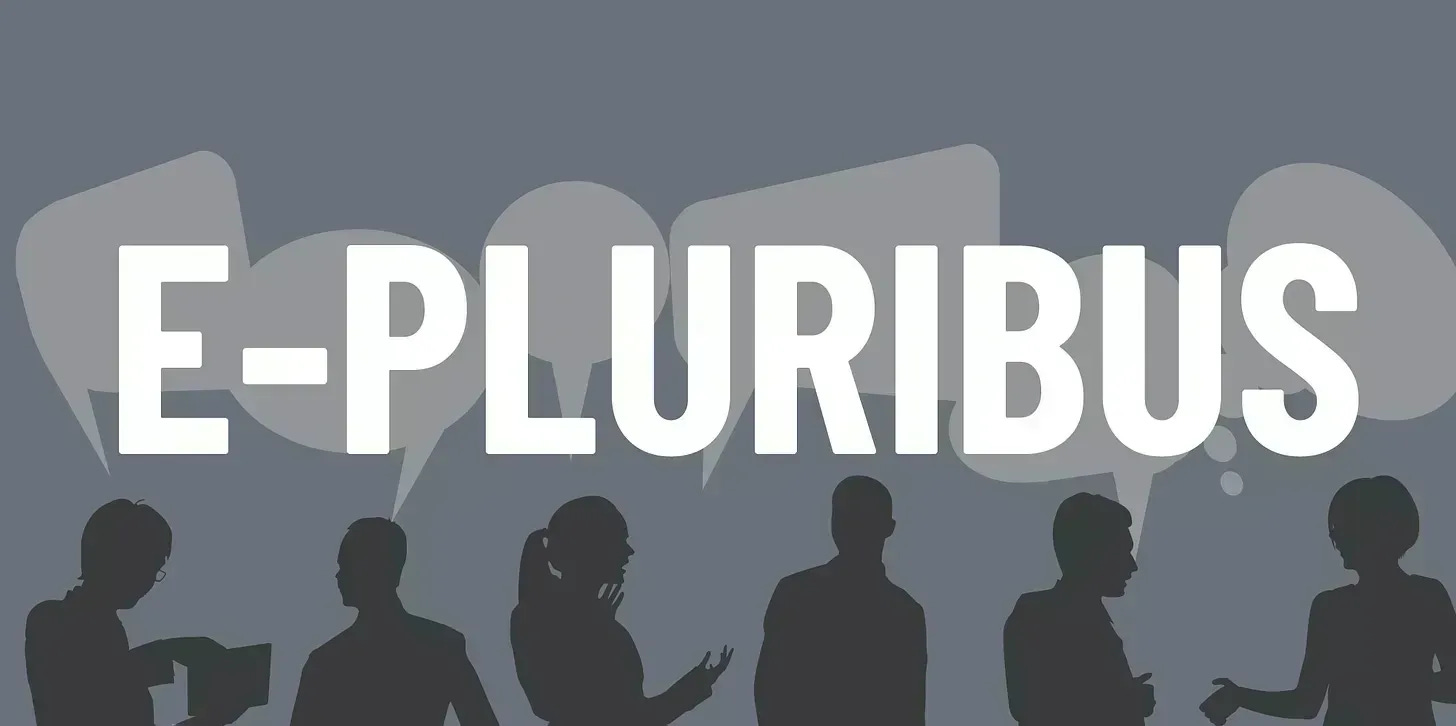E-Pluribus |June 18, 2025
Protecting kids v preserving free speech. Make fun of your mayor, get a subpoena. The case for Palantir.
A round-up of the latest and best musings on the rise of illiberalism in the public discourse:
Hannah Cox: The Kids Online Safety Act is a dangerous bait and switch
Congress is once again trying to protect children from the dangers they often encounter online. Hannah Cox sees it differently. The latest version of the Kids Online Safety Act (KOSA) gives way too much authority to the FTC, she argues, without actually solving problems like sexual exploitation:
As an activist and content creator, I know firsthand that the digital world is a double-edged sword. This is especially true for young users. However, while Sen. Marsha Blackburn (R-TN) and her colleagues want to ride to children’s rescue with a fresh batch of tech regulations, their overreaching proposal will only rope social media companies into a legal wormhole. Blackburn’s attempts at child online safety will only invite government waste, censor online speech, and continue to leave our vulnerable youth at risk.
Hidden between the lines of the KOSA’s misleading child protection rhetoric is a controversial “duty of care” provision that hands the Federal Trade Commission the power to police online activity. Unlike prior failed versions of the KOSA, Blackburn’s latest draft grants the FTC the sweeping freedom to decide what content poses a danger and dole out penalties accordingly.
While shielding children from online harm is a noble end, the KOSA represents all the wrong ways to achieve that. Its legal rigmarole will inevitably lead to time-consuming trials against a handful of cherry-picked apps, and these drawn-out court proceedings will only obstruct the bill’s stated goals. With the FTC locked in an expensive, never-ending battle with private companies, cyberbullying, sexual exploitation, predatory scams, and other daily digital dangers will persist unchecked.
Jonathan Edwards: A man joked about a mayor’s legal trouble. Then, a subpoena arrived
It’s typically state and federal officials who we find violating free speech rights; however, local governments do get in on the censorial action from time to time. A Missouri man discovered this last month after receiving a subpoena for posting a joke about his Mayor:
When a 15-year-old boy disappeared in Riverview, Missouri, last month, James Carroll posted a photo of the boy in the city’s Nextdoor group with a joke: “Someone check Riverview’s mayor’s basement!”
Carroll said his online comment in early April was an attempt to alert the city’s residents to a past lawsuit accusing Mayor Michael Cornell of luring a man from Texas with a promise of a job only to fire him for rejecting Cornell’s sexual advances.
Days after the posting, Carroll received a subpoena demanding he appear at city hall the following afternoon to discuss issues including misuse of information about a missing juvenile, inciting violence against an elected official, defamation and cyberbullying of residents. The subpoena, signed by the mayor and Riverview’s city clerk, warned of “severe penalties” for failing to show up.
On Tuesday, lawyers for the Institute for Justice, a nonprofit public interest law firm and advocacy organization, sent Cornell and other city leaders a letter urging them to rescind the subpoena and “unequivocally disavow” attempts to punish Carroll. The group says the mayor appears to have abused his power and suppressed free speech over an online attempt at humor. “A joke about an elected official is indisputably speech protected by the Constitution,” the nonprofit said in the letter.
Carroll, in an interview, vowed to fight the subpoena, which he ignored.
“It’s important to check him,” Carroll, a 55-year-old mental health counselor, said about the mayor. “I think people need to be aware of what their mayor is doing in that community.”
Cornell and the city of Riverview did not respond to requests for comment.
Danny Crichton: The Government Has Your Data—and That’s a Good Thing
Recent Pluribus newsletters have amplified complaints about the U.S. government’s collaboration with tech giant Palantir, an effort to consolidate access to Americans’ digital information. At City Journal, Danny Crichton says critics of the proposal are well-meaning but mistaken:
Civil libertarians might cheer, but relying on government incompetence isn’t a good way to protect civil rights. Thus, I’m puzzled by the extraordinary level of vitriol—from both the Left and the Right—directed toward the Trump administration’s efforts to update the government’s IT stack via contracts with the data-analysis firm Palantir.
The critics’ main thrust is that a unified system would put the country on a slippery slope to a communist Chinese-style social-credit system. On the right, in particular, the backlash combines an intense hatred of the “deep state” with a seemingly contradictory desire for that very same deep state to fulfill Trump’s policies.
Few of the critics talk about what improving the government’s databases would actually do: simplify tax payments; massively speed up benefits applications; improve criminal-justice efficiency and accuracy; and uncover waste, fraud, and abuse. All of these activities are quotidian in the private sector, but for some reason verboten in the public sector.
I realize we’re not a well-functioning republic, so many hope to cordon the authorities off from our lives as much as possible. But the U.S. government is here to stay. Better to upgrade not just our data infrastructure but the institutions that manage it, too.
What would a more credible system look like? I just recorded a podcast episode with the technologist Joel Burke about his new book Rebooting a Nation, which chronicles the rise of Estonia’s digital government. How did the citizenry of a former Soviet republic once terrorized by secret police allow its newly democratic government to combine so many disparate data sources together into a mostly unified whole?
The answer, essentially, is transparent legibility. Decisions about data were made deliberately and openly, encouraging citizen participation. Robust privacy controls and clear notifications were carefully designed to give people the sense that they had more control over their data than ever before. Estonia’s digital government didn’t appear overnight; it gradually incorporated more data sources through a lengthy transition. Early gains proved useful, helping to build public support for continued expansion.
Around X
The perennial authoritarian, Alexandria Ocasio-Cortez (AOC) makes the case for silencing her political oppone—er, combating “misinformation.”
Illiberalism hasn’t just infected universities, corporate HR departments and political institutions; it’s now worsening mental health care.
Author and political commentator Kennedy laments the trend of once-edgy comedians apologizing for jokes that offend current cultural sensibilities. “Where are your principles, sir?” she asked rhetorically of Jimmy Kimmel and others whom she says have sacrificed their art to appease the mob. Watch the exchange with Reason’s Nick Gillespie here.









